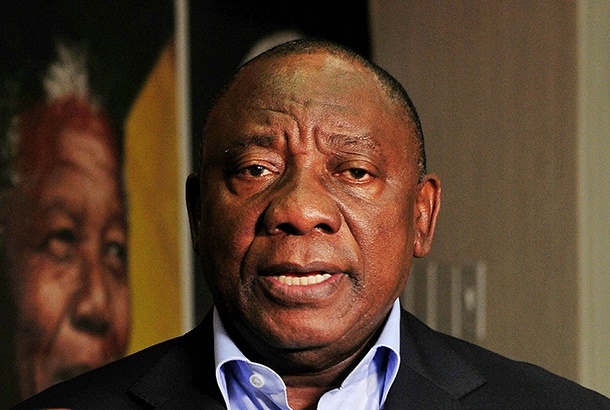
Institutional strength prevented South Africa from sliding into a full kleptocracy.
Strong institutions – courts, public protector and Treasury – shielded the country from bad political leadership which investors saw as a risk.
Indeed, political risk was at its peak until December last year when Cyril Ramaphosa was elected as the president of the African National Congress (ANC).
It was further mitigated by his election as fifth president of democratic South Africa in February 2018. "Ramaphoria" – the euphoria synonymous with his ascendancy – kicked in.
It was disappointingly brief. The Rand retreated from its early appreciation and this, coupled with higher oil prices, produced negative national mood. Entering recession territory dented the euphoria. Emerging from it didn't restore the excitement.
Ramaphoria, it became clear, was more of a national (partly international) sigh of relief about what didn't happen at Nasrec than what happened. It was about the disaster South Africa dodged when Ramaphosa emerged victorious.
Shortly after the evaporation of Ramaphoria, the main issue was how Ramaphosa would go about building his case as a good leader independently. "Not being Zuma" was never going to be a key performance indicator.
Repairing broken state institutions, resetting the economy on a growth path to create jobs and stopping corruption would be key performance indicators.
As a reformer that he is widely seen to be, how has he fared in this regard?
To be fair, his reform agenda has only just begun. But having been exposed to his leadership in the last few months, we can begin to critically assess his performance – particularly on institutional reforms.
There are some great signs the National Persecuting Authority (NPA) is on the path of recovery. The achievement will be partly due to his leadership as well as civil society's campaign through litigation to secure the independence of the head of the NPA.
The Constitutional Court has struck down problematic legal provisions that allowed the president to manipulate the NPA by weakening its head through indefinite suspension and easy dismissal.
Ramaphosa's decision to include the legal profession in the recruitment process was excellent. (Parliament must institutionalise it). The outcome was the appointment of the highly regarded Shamila Batohi.
But until criminals who looted public money are prosecuted and convicted, these reforms will remain academic.
At SARS, the battle to get the institution on track is nearly won. Tom Moyane's "abominable" conduct in seeking to block the reforms have been met with the necessary judicial rebuke.
The SARS inquiry report has given Ramaphosa a lot of room to strengthen the institution. The reforms are urgent to ensure that no typist at SARS should earn R4m for merely being clothed with a title of IT executive.
His decision to remove immunity provision in the state capture inquiry terms of reference was commendable. So is his leadership of the ANC on state capture submissions so far: He has provided no option for closing of ranks.
There have been changes on the boards of state-owned enterprises (SOE) to restore sound governance. Other than removing Gupta functionaries, it's not clear what kind of governance model Ramaphosa would like to install to prevent recurrence of state capture.
He has said the rot went far deeper than previously thought. In which case, much more is required than merely changing executives.
The recent events at Eskom, where the shareholder (government) and not the board, appointed a task team on the entity's sustainability, present a corporate governance challenge. Ramaphosa must be very careful not to replace Gupta state capture model with a suspicious governance model in SOEs.
Ramaphosa was fully entitled to accept the resignation letters of SABC board members. But he hasn't clarified whether it is his preferred corporate governance model that ministers could meet with the staff of entities without the boards.
Ramaphosa has done well to reignite investor confidence. The appointment of investment envoys, the hosting of the investment conference, the hosting of the jobs summit, the finalisation of the mining charter and the signing of the minimum wage legislation will bring about investor certainty.
While it is generally accepted that government solicits advice from ordinary citizens on a range of issues, this should not duplicate work of state institutions.
The work of the recently established biggest consultative committee to assess progress on women empowerment should have been left to the Commission on Gender Equality. Unless Ramaphosa and Minister Bathabile Dlamini believe this Chapter 9 institution is useless.
Ramaphosa's foreign policy is clearly driven by South Africa's economic interests. In international platforms he has sought to position South Africa as a good investment destination. He has done extremely well in this regard. We haven't been embarrassed.
How the expropriation of land without compensation is framed in the final constitutional amendment would determine whether his raft of reforms will hold or not. All he will need is to ensure that an expropriation clause does not allow arbitrary deprivation of property in any way.
The constitutional amendment should be accompanied by legislation spelling out the processes and institutional mechanisms to make expropriation rational. There must be a system of appeals and judicial review.
The constitutional amendment will be lengthy process that will test Ramaphosa's leadership within and outside the ANC.
So far, his rise to power and his performance shows there is a possibility South Africa could be repositioned for growth.
South Africans are growing impatient and increasingly suspicious of political promises. Ramaphosa's reform promises must deliver something tangible. Soon.
- Mkhabela is a regular columnist for News24.
Disclaimer: News24 encourages freedom of speech and the expression of diverse views. The views of columnists published on News24 are therefore their own and do not necessarily represent the views of News24.




 Publications
Publications
 Partners
Partners






















